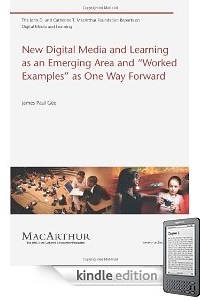New Literacies and ‘worked examples’
 James Paul Gee is a well-known researcher and on New Literacies – and an advocate games-based learning. He came to games late through his grandchildren but has made up for lost time by exploring how they can be used within education.
James Paul Gee is a well-known researcher and on New Literacies – and an advocate games-based learning. He came to games late through his grandchildren but has made up for lost time by exploring how they can be used within education.
The affordances of video games, argues Gee, are much more appropriate for modern-day education than traditional schooling. The following is taken from New Digital Media and Learning as an Emerging Area and “Worked Examples” as One Way Forward, a free publication viewable through an Amazon Kindle (or free software for other devices):
The thinking, problem solving, and collaboration skills required to engage in video game “modding” (modification) look more like important twenty-first-century skills than do the skills on offer in some of our skill-and-drill-test prep schools. So do the social, technical, and organizational skills required to lead a guild in World of Warcraft. It even appears that the reasoning required to engage in debates on many Internet forums involving technical matters (e.g., making mods for Warcraft) often resembles valued forms of scientific reasoning, forms that we have difficulty gaining in school with all our textbooks (Steinkuehler 2006, 2008a, 2008b). (Location 138)
Invoking Wittgenstein’s ‘private language’ argument, Gee talks of the importance of social learning and how content cannot be learned effectively if divorced from context:
People learn a given way of reading or writing by participating in (or at least coming to understand) the distinctive social and cultural practices of different groups. When these groups teach or “apprentice” people to read and write in certain ways, they never stop there. They teach them to act, interact, talk, know, believe, and value in certain ways as well, ways that “go with” how they write and read (Gee 1990). So, for example, knowing how to read or write a game faq (a strategy guide for a video game) requires knowing how game faqs are used in the social practices of gamers, practices that involve much more than just reading and writing. It requires knowing how gamers talk about, debate over, and act in regard to such things as “spoilers” and “cheats”-and how “cheating” is defined by gamers, not just in general terms (Consalvo 2007). (Location 188)
Gee goes on to note that ‘worked examples’ are usually the preserve of well-established disciplines and domains. Those new to the domain usually work through and follow the thinking of luminaries. The fast-paced and multi-faceted nature of New Literacies, however, means that we should not wait for things to solidify before starting with such worked examples.

